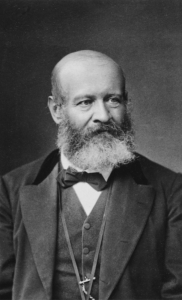 Happy Birthday Alfred Escher
Happy Birthday Alfred Escher
In times where innovation and entrepreneurship is discussed across the globe, the name Alfred Escher needs to be mentioned. Maybe one of the most influential entrepreneurs of all times. Yet, back in the days where he was actively engaged, quite some people were undecided if what he does is of any value, several even thought it’s the biggest wast of time and resources of all times. It was in the days when Switzerland was the poorest nation in Europe and his ideas have been everything but obvious for the average Swiss.
In retrospect we can say he single handedly built the foundation of the swiss economy and the swiss prosperity as we know it today. It was this foundation that propelled Switzerland from the poorest country in Europe to one of the top most prosperous countries in the world. It seems almost impossible that a single person could make that happen. And it is also probably the best example to demonstrate to entrepreneurs in the developing and emerging world, which represents more than 75% of humankind that there is an opportunity for every nation and even every entrepreneur to change the world – at least the nation he or she lives in.
Escher’s Work
Alfred Escher, was neither an engineer nor a banking expert. He was a great visionary with enormous power to put things into practise. He was fascinated not only by technology but also by the idea of networking various forces for the common good and making them more productive. In that respect, he was one of the forerunners of globalization.
His entrepreneurial engagement was unparalleled. Between 1848 and 1860 he founded the most strategic businesses of the early Swiss economy. In 1852 he founded the North East Railroad running between Lake Constance and Zurich, bringing the train connection from Germany to Switzerland. In 1854 he founded the Swiss Polytechnikum, today ETH, one of the most renown tech universities in the world. With such a university he was able to attract young talents and had them educated for the sophisticated project he organized. In 1856 he founded the Swiss Credit Company, today Credit Suisse, one of the world’s biggest banks. That bank was able to attract foreign capital and stimulated other businesses, the ecosystem of Escher development. New companies, supporting and competing had been inspired by Escher’s engagement, to a degree that Switzerland began to grow to a self propelled economy. And in 1857 he founded the Swiss Life Insurance and Pension Company, today Swiss Life, again one of the world’s most renown insurance companies. Finally, Alfred Escher became the driving force behind the Gotthard Tunnel development and one more time demonstrated that infrastructure is the core of all economic development. As far as we could research, no other person in the world had such an impact to a nationwide economic development – in such a short period of time.
The big learning
When comparing today’s world and its emerging countries, with what happened back then, no NGO, no support organization and no other government would have supported Escher’s crazy ideas. The Swiss country – people would argue – needs everything but a railroad, they need agricultural development aid, they don’t need a sophisticated bank but more people who at least own their own store. They need educated workers not Ph.Ds. IN retrospect all the short sighted analysis what they would need would have lead to failure. Looking into Africa – nobody had seen the rapid growth of mobile phones, because the “analysis” would tell what they need and a mobile phone is the last thing on that list. But the cell phones helped ignite economic development. Gladly for Switzerland, in the mid 1800’s there was no NGO that consulted the Swiss government what to do.
Today, February 20, 2020, is Alfred Escher’s 101’st Birthday. More can be found at the Alfred Escher Foundation

